1 YONGKOM YONGKOM (YONGOM, YONGGOM) ... 2,000 in Irian ...
1 YONGKOM YONGKOM (YONGOM, YONGGOM) ... 2,000 in Irian ...
1 YONGKOM YONGKOM (YONGOM, YONGGOM) ... 2,000 in Irian ...
Create successful ePaper yourself
Turn your PDF publications into a flip-book with our unique Google optimized e-Paper software.
*<br />
(KATI)<br />
Go<strong>in</strong>g down the river Digul we meet the tributary Ka o on the<br />
left. This name Ka o is a corruption of the native word Kowo.<br />
One of the affluents of the Kowo is the river Muju. The tribes<br />
liv<strong>in</strong>g between Muju and Ka o are called Mujunese by the Dutch<br />
Government and the Catholic Mission. In their own language there<br />
is no such word as <strong>in</strong>dicates the whole of the tribes, but they<br />
are called Qa u ti by the Jaqa i -people, liv<strong>in</strong>g <strong>in</strong> the bas<strong>in</strong> of the<br />
river Mapi; and Ghawisi by the A u ju-people, liv<strong>in</strong>g between the<br />
Digul and the Mapi. The territory, where the Qa u ti-people live,<br />
has not yet been described, nor has the number of the dialects<br />
already been fixed. The population has been concentrated <strong>in</strong><br />
villages only for a short time; the local differences <strong>in</strong> speech<br />
are <strong>in</strong>numerable. Drabbe has been able to ascerta<strong>in</strong> two dialects<br />
viz. the dialects of Ni<strong>in</strong>ati, a village on the Muju, and of<br />
Metomka, situated to the south of the village of Kiptem. The<br />
names Ghawisi and Qa u ti are related to the word kati, which<br />
accord<strong>in</strong>g to Drabbe <strong>in</strong> the dialect of Ni<strong>in</strong>ati means "real man";<br />
therefore Drabbe speaks of this language as the Kati-language.<br />
We analyse the Ni<strong>in</strong>ati-dialect.<br />
- Boelaars 1950:77.<br />
*<br />
De mensen zelf die de Kati-taal spreken hebben geen algemene<br />
naam om volk of taal aan te duiden. Door de Jaqaj's <strong>in</strong> het<br />
stroomgebied van de Mapi-rivier echter, en door de Awju's die<br />
voornamelyk wonen tussen Digul en Mapi worden ze genoemd resp.<br />
Qàwti en Chàwisi. Deze namen staan hoogstwaarschynlyk <strong>in</strong> verband<br />
met het Kati woord kati, dat <strong>in</strong> het Ni<strong>in</strong>ati-dialect betekent<br />
"echte mens"; <strong>in</strong> het Metomka-dialect spreekt men van katuk ti.<br />
Eigenlyk past <strong>in</strong> de mond der Kati's dat woord op alle Papoea's,<br />
<strong>in</strong> tegenstell<strong>in</strong>g met het woord okan, dat gerbuikt wordt voor<br />
overzeese vreemdel<strong>in</strong>gen. By gebrek aan beter duiden we dus het<br />
volk te dat woont tussen de Kao, een l<strong>in</strong>kerzyrivier van de Digul,<br />
en de Muju die weer een zyrivier is van de Kao aan het de naam<br />
Kati, met de toon op de laatste lettergreep. De naam Kao is een<br />
verbaster<strong>in</strong>g van vreemdel<strong>in</strong>gen, en de eigenlyke naam is Kowo; de<br />
Muju wordt dialectisch ook wel Ok-Mii genoemd. ... We bespreken<br />
hier twee verschillende dialecten; het eerste wordt gesproken <strong>in</strong><br />
de omtrek van Ni<strong>in</strong>ati aan de Muju, zowel ten Oosten als ten<br />
Westen van die rivier. Het tweede spreekt men aan de Kowo, en<br />
verder <strong>in</strong> alle dorpen ten Zuiden van het dorp Jiptem. Een<br />
overgang van de twee v<strong>in</strong>dt men te Namat, Mokbiran en Wambiran.<br />
Het eerste noemen we Ni<strong>in</strong>ati-dialect, het tweede Metomka-dialect<br />
naar de dorpen van onze zegslui. Behalve dat er twee duidelyk<br />
onderscheiden dialecten zyn, moeten we nog opmerken, dat<br />
tengevolge van de vroegere woonwyze der Kati's de taal van het<br />
ene dorp tot het andere nog al verschilt. ...<br />
7


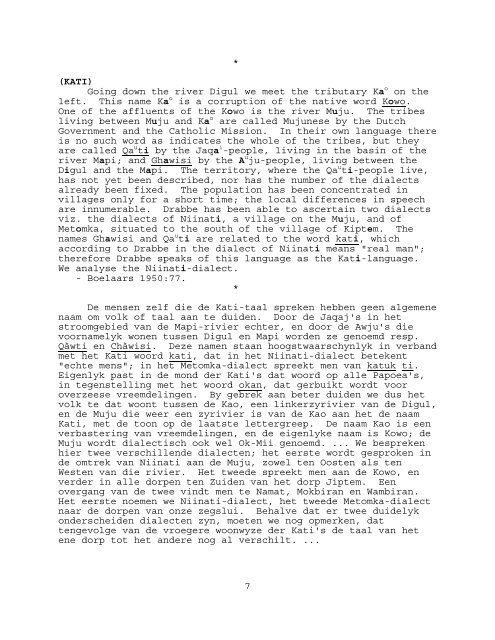
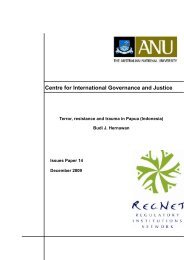
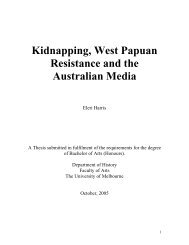
![[1958: Gahuku]. - PapuaWeb](https://img.yumpu.com/25139694/1/190x245/1958-gahuku-papuaweb.jpg?quality=85)
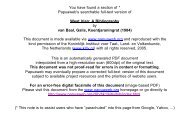
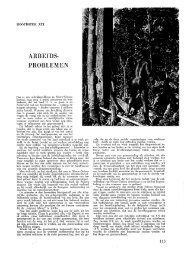
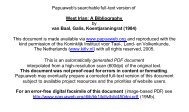
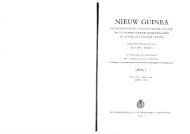
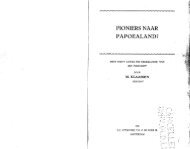
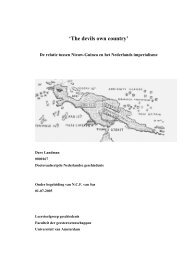
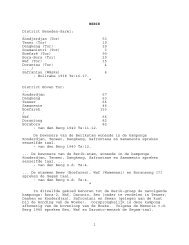
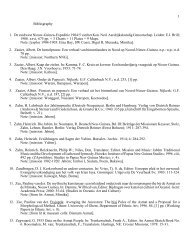

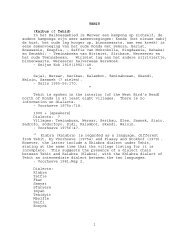
![1 EKARI (EKAGI) [Map] (cf S&C) Akaromani Apoejai ... - PapuaWeb](https://img.yumpu.com/19731685/1/190x245/1-ekari-ekagi-map-cf-sc-akaromani-apoejai-papuaweb.jpg?quality=85)
![WUTUNG [passim in text] Wutung (Oenaki, Oinåke) - Friederici ...](https://img.yumpu.com/15960045/1/190x245/wutung-passim-in-text-wutung-oenaki-oinake-friederici-.jpg?quality=85)